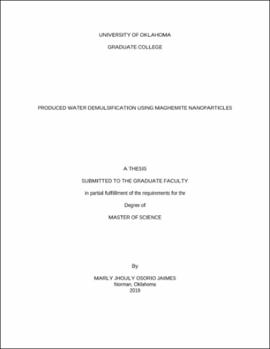| dc.contributor.advisor | Ahmed, Ramadan | |
| dc.contributor.author | Osorio Jaimes, Marly Jhouly | |
| dc.date.accessioned | 2020-12-18T19:36:27Z | |
| dc.date.available | 2020-12-18T19:36:27Z | |
| dc.date.issued | 2020-12-18 | |
| dc.identifier.uri | https://hdl.handle.net/11244/326648 | |
| dc.description.abstract | Produced water management has become an important topic among oil and gas operators due to recent environmental regulations. Produced water requires treatment for recycling or disposal to the environment. Different methods are developed for reducing the content of residual oil in produced water; however, the existing techniques are usually expensive and/or generate secondary pollutants. Magnetic nanoparticles such as magnetite (Fe3O4) and maghemite (-Fe2O3) have been extensively studied for various applications. Maghemite nanoparticles have shown potential in water treatment due to their suitable surface charge, magnetic characteristics, and inexpensiveness. The objectives of this study are to investigate the method of synthesis and residual oil removal efficiency of maghemite nanoparticles.
To achieve these goals, different chemical co-precipitation procedures were considered for the synthesis of maghemite nanoparticles. After synthesis, nanoparticles were used in the treatment process that involves the preparation of nanosuspension, demulsification of produced water using nanosuspension, and separation of oil-containing nanoparticles using a magnet. During the treatment, the nanosuspension was mixed (1:1 volumetric ratio) with produced water samples that were sourced from different oilfields. Then, the mixture was subjected to a magnetic field generated by a permanent magnet, in which a rapid cleaning of water was observed as the magnet quickly attracts the particles.
The removal of oil from produced water was confirmed using an oil content analyzer. The desired oil removal efficiencies were achieved with the implementation of this method. In every experiment performed, oil removal efficiencies of more than 97% were recorded. After the collection of the used nanoparticles, the oil was removed/extracted by washing particles with ethanol and sodium chloride brine sequentially. Without losing their effectiveness, the nanoparticles were reused up to 11 times in treatment for multiple cycles. The implementation of maghemite nanoparticles constitutes a novel method with great potential for large-scale application in the treatment of produced water in various industries. | en_US |
| dc.language | en | en_US |
| dc.subject | Nanoparticles | en_US |
| dc.subject | Produced water | en_US |
| dc.subject | Maghemite | en_US |
| dc.title | Produced water demulsification using maghemite nanoparticles | en_US |
| dc.contributor.committeeMember | Salehi, Saeed | |
| dc.contributor.committeeMember | Karami Mirazizi, Hamidreza | |
| dc.date.manuscript | 2020-12-17 | |
| dc.thesis.degree | Master of Science | en_US |
| ou.group | Mewbourne College of Earth and Energy::Mewbourne School of Petroleum and Geological Engineering | en_US |
| shareok.orcid | 0000-0002-4104-6801 | en_US |
| shareok.nativefileaccess | restricted | en_US |
